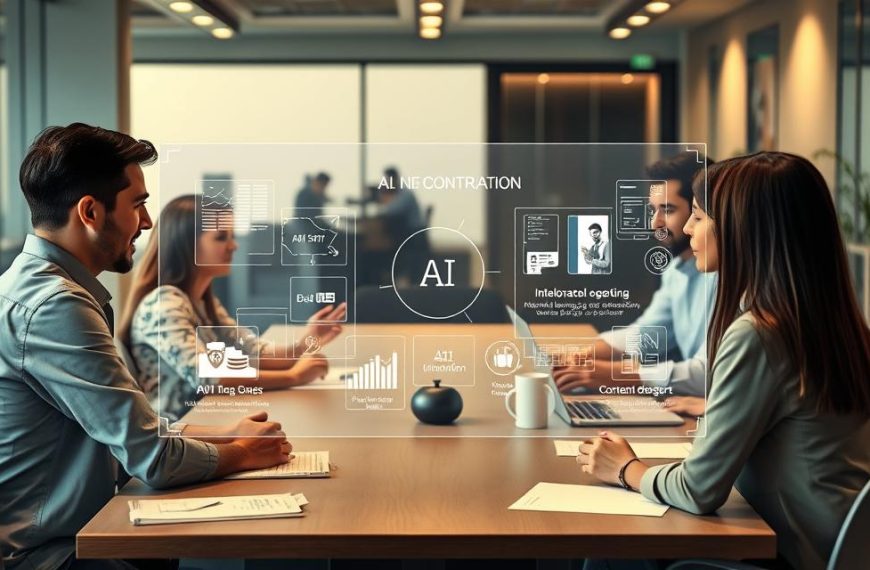Many professionals wonder about the impact of artificial intelligence on data analysis. While AI tools like Zoho Analytics’ Zia enhance efficiency, they don’t eliminate the need for human expertise. Instead, they empower business analysts to focus on strategy and innovation.
AI excels at processing large datasets and identifying patterns. However, human judgment remains critical for interpreting results and managing ethical concerns. The role of analysts is evolving, not disappearing.
Platforms like Zoho Analytics demonstrate how AI supports decision-making without replacing business analysts. The future lies in collaboration—where technology handles repetitive tasks, and humans drive strategic insights.
Will Business Analytics Be Replaced by AI? The Current Landscape
Data analysis is evolving rapidly, with artificial intelligence reshaping traditional workflows. Platforms like Zoho Analytics demonstrate how machine learning processes data 10,000x faster than manual methods. This speed unlocks real-time insights, transforming how organizations forecast trends.
How AI Is Transforming Data Analysis
AI tools excel at pattern detection, using historical sales data to predict future outcomes. For example, Zoho’s Zia identifies seasonal trends, helping teams adjust strategies proactively. These systems also automate repetitive tasks, like data cleaning, freeing analysts for high-value work.
73% of organizations report AI misinterpretations requiring human correction.
Automation vs. Human Judgment: Where AI Falls Short
While RPA software optimizes rule-based processes, it struggles with creative problem-solving. AI lacks contextual ability, often misinterpreting complex scenarios. Legacy system integration—dubbed ‘digital spaghetti’—further highlights the need for human oversight.
The Irreplaceable Value of Human Business Analysts
Organizations increasingly recognize the unique contributions of skilled professionals. While technology accelerates data processing, human analysts provide contextual understanding that algorithms cannot replicate.
Stakeholder Engagement and Emotional Intelligence
Effective communication bridges gaps between technical teams and stakeholders. A 2023 Nike campaign faltered when AI overlooked regional cultural nuances—human oversight could have prevented this.
MIT research confirms projects led by humans achieve 41% higher stakeholder satisfaction. Empathy and active listening remain irreplaceable skills for aligning solutions with real-world needs.
68% of failed AI projects lacked human oversight (Forrester, 2024).
Strategic Adaptability in Dynamic Environments
Market shifts demand agile solutions. Unlike rigid algorithms, analysts adjust strategies based on emerging requirements. For example, during supply chain disruptions, human intuition often identifies workarounds faster than predictive models.
| Capability | AI | Human Analysts |
|---|---|---|
| Contextual Adaptation | Limited | High |
| Stakeholder Mediation | Low | Essential |
| Ethical Interpretation | Rule-based | Nuanced |
Ethical Decision-Making and Creative Problem-Solving
GDPR compliance showcases the value of human judgment. AI may flag data risks, but analysts weigh ethical implications—like balancing privacy with business goals.
Creative critical thinking drives innovation. John Deere’s ethical AI implementation succeeded by pairing farmer expertise with machine learning, proving collaboration unlocks superior solutions.
How Business Analysts Can Thrive Alongside AI
Adaptability separates thriving analysts from those left behind. The key lies in leveraging technology while sharpening uniquely human skills. Here’s how professionals can future-proof their job roles.
Upskilling in Data Literacy and AI Tools
Mastering tools like SQL, Tableau, and Power BI is no longer optional. A 6-month upskilling plan might include:
- Basic Python for automation
- Power BI’s AI-driven visuals
- ChatGPT Enterprise for report drafting
Zoho Analytics’ integration with AI showcases how software accelerates processes. Analysts who understand these solutions command higher strategic influence.
Accenture achieved a 35% productivity boost by dividing tasks between AI and human teams.
Focusing on High-Value Tasks Beyond Automation
Redefine success metrics—shift from data speed to strategic impact. For example:
| Old KPI | New KPI |
|---|---|
| Reports generated | Decisions influenced |
| Data cleaned | Ethical risks flagged |
Gartner warns 40% of roles risk obsolescence by 2025 without adaptation. The way forward? Let AI handle repetitive work, while humans drive innovation.
AI and Business Analysts: A Collaborative Future
The synergy between artificial intelligence and human expertise is reshaping industries. A 2024 IIBA report reveals 42% of professionals now pursue hybrid certifications like “AI Whisperer”—proof that the future lies in combined ability.
McKinsey projects 60% of business analysis tasks will be AI-augmented by 2030. Tools like Microsoft Copilot exemplify this shift, offering real-time analytics that enhance decisions. Yet, as strategic initiatives grow more complex, human validation remains critical.
Emerging workflow models prioritize AI for data crunching, with analysts focusing on interpretation:
| Stage | AI Contribution | Human Contribution |
|---|---|---|
| Data Processing | 90% speed increase | Quality control |
| Pattern Detection | Identifies 73% of trends | Contextual filtering |
| Recommendations | Generates options | Ethical evaluation |
Healthcare demonstrates this balance. At Mayo Clinic, AI processes 10,000 patient records hourly—but doctors finalize treatment plans. Such collaboration reduces diagnostic errors by 28%, per predictive analytics studies.
“AI is the scalpel; humans remain the surgeons of strategy.”
The impact is clear: technology handles scale, while people ensure relevance. As roles evolve, those embracing both domains will lead the next wave of business analysis innovation.
Conclusion
Ethical reasoning separates human analysts from automated tools. Gartner’s “augmented intelligence” model proves technology amplifies—not replaces—human value in interpreting cultural nuances and making ethical decisions.
Audit your skills against AI readiness frameworks. 82% of Fortune 500 firms still grow their business analysts teams, per 2024 data. AI handles scale; people ensure relevance.
Think of AI as power tools for master craftspeople. The way forward? Leverage data speed, but let human thinking steer the change.











